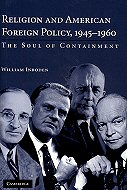Religion and American Foreign Policy, 1945-1960:
The Soul of Containment
|
|
William Inboden
|

|

The Cold War was in many ways a religious war. Presidents Truman and Eisenhower and other American leaders believed that human rights and freedoms were endowed by God, that God had called the United States to defend liberty in the world, and that Soviet communism was especially evil because of its atheism and its enmity to religion. Along with security and economic concerns, these religious convictions also helped determine both how the United States defined the enemy and how it fought the conflict. Meanwhile, American Protestant churches failed to seize the moment. Internal differences over theology and politics, and resistance to cooperation with Catholics and Jews, hindered Protestant leaders domestically and internationally. Frustrated by these internecine disputes, Truman and Eisenhower attempted instead to construct a new civil religion. This public theology was used to mobilize domestic support for Cold War measures, to determine the strategic boundaries of containment, to appeal to people of all religious faiths around the world to unite against communism, and to undermine the authority of communist governments within their own countries.
William Inboden is currently the Senior Vice President of the Legatum Institute. He previously served as Senior Director for Strategic Planning on the National Security Council at the White House. He has also worked at the State Department as a member of the Policy Planning staff and in the Office of International Religious Freedom, and at the American Enterprise Institute as a Civitas Fellow.
|
|
